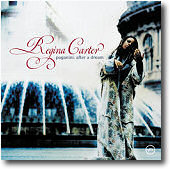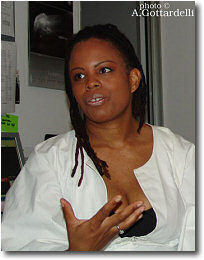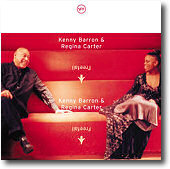|
Regina Carter was
born in Detroit, a cosmopolitan city, which gave her the opportunity to be
surrounded by several different cultures. This influenced her cultural growth
allowing her to be interested to all kinds of music in a opened way, from the
classical one, the origin of her educational path, until to jazz music without
giving up folk and pop music where she still gets ideas for her repertory. She
has recorded several albums. Among them we underline
Rhythm of the Heart
(1999)
where she performes with
 Cassandra
Wilson and Kenny Barron together with she has also recorded
Freefall
(2001).
Her carreer, as a violinist, has broght her until the
Genoa town's invitation of playing
the famous Niccolò Paganini's violin. It is called "Il cannone"
(The Cannon) and it was made
in
1742
by Giuseppe Guarneri.
In
1840
it was donated to Genoa at
the death of who is probably up till now the greatest violinist of all
time. Obviously, such an invitation heated controvery until the remarkable
Regina Carter's
performance at Carlo Felice theatre on 30th December
2001
in front of an audience that gave her a standing ovation. That also
became the album
Paganini: After a dream. Cassandra
Wilson and Kenny Barron together with she has also recorded
Freefall
(2001).
Her carreer, as a violinist, has broght her until the
Genoa town's invitation of playing
the famous Niccolò Paganini's violin. It is called "Il cannone"
(The Cannon) and it was made
in
1742
by Giuseppe Guarneri.
In
1840
it was donated to Genoa at
the death of who is probably up till now the greatest violinist of all
time. Obviously, such an invitation heated controvery until the remarkable
Regina Carter's
performance at Carlo Felice theatre on 30th December
2001
in front of an audience that gave her a standing ovation. That also
became the album
Paganini: After a dream.
We met Regina Carter in Milan, at the Blue Note, between
the first and the second set.
 JI: JI:
I know you adopted the Suzuki Method, could you tell something about it?
RC: It's a Japanese method of teaching music to children learners from the age of about two and what it is, is taught the same way that children basically learn how to speak at home by imitating and so you hear and it's a lot of ear training and what you hear you have to sing back and play back and you learn your instrument that way. Everyone that studies in the year around the world they play, they're...if you are on the book 1 or the book 2 you're playing the same music so...once a year all the teachers from all over the world come together for a big meeting or congress
But it's a great method because even though you don't know how to read, right away you can play music pretty fast and I think you keep children very interested in music because at first you have to learn all of those technical aspects and that's very boring.
JI: So you started using your heart very soon...
RC: (smile...)...and you get it, thank you...
 JI: What is your approach to music, because I know you like a lot of different kinds of music... JI: What is your approach to music, because I know you like a lot of different kinds of music...
RC: If I hear a piece that I like then I try and play it but first I have to see if it works on the instrument and if it works for me, because everything doesn't; but I like so many different styles and I think that's because of growing up in the city that I grew up was a very effectively diverse city. So I was around many cultures of people without having to leave in the United States and being introduced into their music, into their culture, into their food and so, all was very attractive for me. When I was a child everyone else's culture was horn; they seemed like they had a culture for me; you know, I didn't feel like I had one and so I think that's why I caught around culture outside of the United States.
JI: I read that you also have had some interests with indian music
RC: Yes...almost every music that exist in the world
have some string instrument whether is a violin or something of very similar to
violin
JI: What kind of special effects do you use palying violin?
RC: Well, I don't use any outside effects, I use the violin itself. So like I use harmonic, false harmonic, fingers harmonic and I do things with the bow to get a sound like feedback sometimes, like a guitar. It's all just natural things that you can do on your instrument. When I was younger I had all of those effects in the pedal but I find that A) I don't wanna carry all the stuff around B) it's much more exciting to try and get those sounds out of the natural instrument itself.
JI: What kind of violin do you use?
RC: It's an old acoustic German violin...
JI: Does it have a nickname?
RC: No it doesn't... :-))
JI: What about the duet with Mr. Kenny Barron?
 RC: That was an amazing experience. The first time we played together there was a connection, a musical connection or… We were just…We could not l RC: That was an amazing experience. The first time we played together there was a connection, a musical connection or… We were just…We could not l ook at each other we just played things not having played together before being in the same place at the same time and so…It took us five years to get out a schedule together to make that record and for me it was very special because it was a record totally about art, about music; it had nothing to do with sales and nothing to do with record companies, none of that. We just went into the studio we both brought a list of tunes that we liked, and we played them. If it worked we recorded it, if it didn't we didn't. For me it caught me. It was like a gift, because I didn't have to worry about all the outside...fear, you know, just about music. ook at each other we just played things not having played together before being in the same place at the same time and so…It took us five years to get out a schedule together to make that record and for me it was very special because it was a record totally about art, about music; it had nothing to do with sales and nothing to do with record companies, none of that. We just went into the studio we both brought a list of tunes that we liked, and we played them. If it worked we recorded it, if it didn't we didn't. For me it caught me. It was like a gift, because I didn't have to worry about all the outside...fear, you know, just about music.
JI: Would you like to repeat this kind of experience, may be with another artist?
RC: Yes, I had the pleasure of … I played a concert with
Christian Mc Bride's band just a couple of weeks ago and Geoff Keezer
played piano and we did a completely improvised piece together and I had never played with Geoff and I thought like we had a connection as well, so I'd like to work with Geoff, something like that, maybe in the future.
Thanks Regina for your time and...enjoy your music forever... ;-)
Click here to see Alberto Gottardelli's concert photos
Insert a comment
©
2000 - 2004 Claudia Bernath - Jazzitalia.net - All Rights reserved
|
© 2000 - 2026 All the material published on Jazzitalia is exclusively owned by the author. Moreover it is protected by International Copyright, so it is forbidden any use of it which isn't authorised by the rights' owner.
|
This page has 4.189 hits
Last Modified Date: 31/03/2010

|
|

